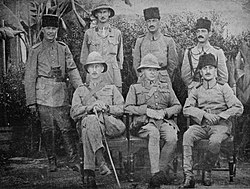| << | April 1916 | >> | ||||
|---|---|---|---|---|---|---|
| Su | Mo | Tu | We | Th | Fr | Sa |
| 1 | ||||||
| 2 | 3 | 4 | 5 | 6 | 7 | 8 |
| 9 | 10 | 11 | 12 | 13 | 14 | 15 |
| 16 | 17 | 18 | 19 | 20 | 21 | 22 |
| 23 | 24 | 25 | 26 | 27 | 28 | 29 |
| 30 | ||||||


The following events occurred in April 1916:
Contents
- Saturday, April 1, 1916
- Sunday, April 2, 1916
- Monday, April 3, 1916
- Tuesday, April 4, 1916
- Wednesday, April 5, 1916
- Thursday, April 6, 1916
- Friday, April 7, 1916
- Saturday, April 8, 1916
- Sunday, April 9, 1916
- Monday, April 10, 1916
- Tuesday, April 11, 1916
- Wednesday, April 12, 1916
- Thursday, April 13, 1916
- Friday, April 14, 1916
- Saturday, April 15, 1916
- Sunday, April 16, 1916
- Monday, April 17, 1916
- Tuesday, April 18, 1916
- Wednesday, April 19, 1916
- Thursday, April 20, 1916
- Friday, April 21, 1916
- Saturday, April 22, 1916
- Sunday, April 23, 1916
- Monday, April 24, 1916
- Tuesday, April 25, 1916
- Wednesday, April 26, 1916
- Thursday, April 27, 1916
- Friday, April 28, 1916
- Saturday, April 29, 1916
- Sunday, April 30, 1916
- References
- Sources






